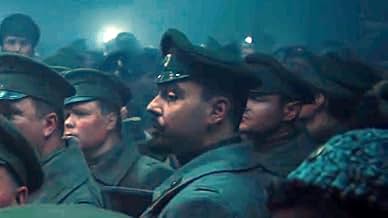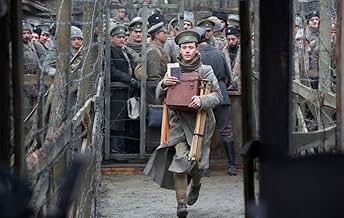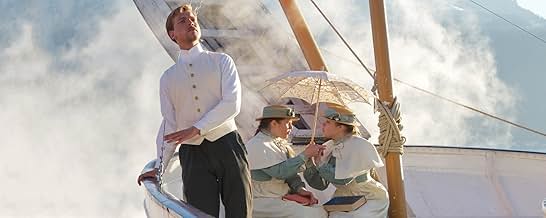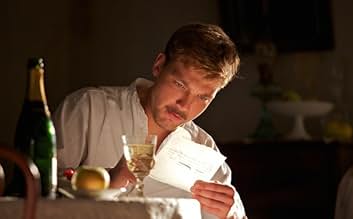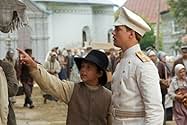Solnechnyy udar
- 2014
- 2 Std. 55 Min.
IMDb-BEWERTUNG
5,8/10
1229
IHRE BEWERTUNG
Füge eine Handlung in deiner Sprache hinzuOfficers of the White Army, holding as POWs in a Red Army's camp, try to understand why they lose Civil War and lost the Russian Empire at all.Officers of the White Army, holding as POWs in a Red Army's camp, try to understand why they lose Civil War and lost the Russian Empire at all.Officers of the White Army, holding as POWs in a Red Army's camp, try to understand why they lose Civil War and lost the Russian Empire at all.
- Auszeichnungen
- 6 Gewinne & 3 Nominierungen insgesamt
Martins Kalita
- Poruchik
- (as Martinsh Kalita)
Empfohlene Bewertungen
This movie is actually two different stories. One is Bunin's short story Sunstroke which is shown in a beautiful and poetic way in the movie. It represents the past, old Russia, the time Bunin never dropped in his mind. The other is taken from his famous anti Bolshevism book Cursed Days. This part is shown in the movie, in a wet and muddy way, about a group of old officers waiting for their destiny after signed their declarations of surrender.
It is understandable that the director tried to divide these two stories. Old is good, elegant, beautiful, lovely, honestly. New is chaotic, dirty, brutal, empty. Although one may not fully agree with it, but this is what Ivan Bunin's understanding of Bolshevism Revolution and the opinion is widely accepted after the collapse of Soviet Russia. Nikita Mikhalkov's most famous movies are almost about the same attitude.
But the director also used his movie to pay tribute to old Soviet movie traditions. There's an astonishing shot of a baby carriage rolling downsteps, which is obviously something reminding Eisenstein. There's also certain images reminding Bondalchuk.
So far there's no problem with the two stories go in parallel. But at the very end the stories tried to reach a point of combination. This became so hard to believe that the climax felt a little bit strange.
Still it's a great movie. Despite its length, the storytelling speed is extremely well that one hardly felt the time's gone. It might also be one element the director had in mind. Time went without raising attention, old time went like river never comes back.
It is understandable that the director tried to divide these two stories. Old is good, elegant, beautiful, lovely, honestly. New is chaotic, dirty, brutal, empty. Although one may not fully agree with it, but this is what Ivan Bunin's understanding of Bolshevism Revolution and the opinion is widely accepted after the collapse of Soviet Russia. Nikita Mikhalkov's most famous movies are almost about the same attitude.
But the director also used his movie to pay tribute to old Soviet movie traditions. There's an astonishing shot of a baby carriage rolling downsteps, which is obviously something reminding Eisenstein. There's also certain images reminding Bondalchuk.
So far there's no problem with the two stories go in parallel. But at the very end the stories tried to reach a point of combination. This became so hard to believe that the climax felt a little bit strange.
Still it's a great movie. Despite its length, the storytelling speed is extremely well that one hardly felt the time's gone. It might also be one element the director had in mind. Time went without raising attention, old time went like river never comes back.
10papaioan
Sublime fusion of two of Bunin's works, with beautifully achieved juxtaposed cinematography. The viewer is put in the shoes of the protagonist's plight while bitterly recollecting the most hopeful moment in his past.
I won't give away the "key" -- that's for the viewer to discover -- but until I figured it out for myself, about 2/3 of the way through, I was so exasperated by this movie that I was tempted to just give up on it and quit. I thought it was incoherent and disjointed, and actually got peeved since I thought it was screwing with me.
But THEN... I figured out who/what the young officer in white, and the various appearances of the attractive woman, represented... and my whole experience changed. By the end of the movie, I was devastated. The lingering final image and text -- and the song sung over it -- left me trembling and weeping. The whole thing haunted me for days, then weeks, afterward.
I intend to watch it again from the beginning, now that I know what it's about. But I am waiting a bit, since I still haven't recovered from that first experience.
This is a very different kind of movie. It's NOT a straight story/narrative, and expecting such will just leave you frustrated. Mikhalkov is a sort of poet, who has used seemingly unconnected images to evoke feelings and impressions. He uses visual/emotional images to conceal deep realities of history. And, for this viewer at least, realities of humanity in general. For though the movie is concerned with 20th-century Russia/USSR, it speaks to me, as an American in 2022, of a more general truth, one we should all take to heart as our own glittering Western consumer culture heads for collapse: Concealed beneath superficially beautiful things (and hoo-boy, are the "in-color" parts of this movie a sensual feast for the eyes!) can lie the ugliest horrors of which humans are capable.
But THEN... I figured out who/what the young officer in white, and the various appearances of the attractive woman, represented... and my whole experience changed. By the end of the movie, I was devastated. The lingering final image and text -- and the song sung over it -- left me trembling and weeping. The whole thing haunted me for days, then weeks, afterward.
I intend to watch it again from the beginning, now that I know what it's about. But I am waiting a bit, since I still haven't recovered from that first experience.
This is a very different kind of movie. It's NOT a straight story/narrative, and expecting such will just leave you frustrated. Mikhalkov is a sort of poet, who has used seemingly unconnected images to evoke feelings and impressions. He uses visual/emotional images to conceal deep realities of history. And, for this viewer at least, realities of humanity in general. For though the movie is concerned with 20th-century Russia/USSR, it speaks to me, as an American in 2022, of a more general truth, one we should all take to heart as our own glittering Western consumer culture heads for collapse: Concealed beneath superficially beautiful things (and hoo-boy, are the "in-color" parts of this movie a sensual feast for the eyes!) can lie the ugliest horrors of which humans are capable.
Excellent movie, excellent direction and acting, fantastic scenaries and photograph. Unfairly Underrated in IMDM probably by American pie watchers
To my mind, it's one of greatest movies in this century. It's about man's tragedy in personal life and death of his country. He asks again and again in the first scene of this film: how this happened? The answer is: each of us influence history (as I understand this) - our actions, even thoughts and desires, Main hero (Poruchik - Martinsh Kalita) is indifferent about all except his individual desire. He can't make the right choice in his love and he can't come round until the moment of his death. It's too late for him, too late for his homeland. Bt film isn't didactic, this movie has exceptional artistic values. Director Nikita Mikhalkov knows enormous number of sophisticated nuances of human soul as professional secrets of cinema. The artistic result is outstanding. The cast is very successful, music is very touching, photography is splendid. Mikhalkov's enemies tries to denigrate him very hard. But it's method of communists and fascists - to assess art in politic terms. Everybody has rights to reject political views of Mikhalkov. But reject the great art of politic isn't democracy, it's totalitarianism. "Sunstroke" contains nothing denying human rights, humanism, etc.
Wusstest du schon
- WissenswertesThe film was selected as the Russian entry for the Best Foreign Language Film at the 88th Academy Awards but it was not nominated.
- VerbindungenFeatured in Vecherniy Urgant: Nikita Mikhalkov/Viktoriya Solovyova (2014)
- SoundtracksNe dlya menya
Music by Nikolay Devitte
Lyrics by A. Molchanov
Performed by Nikita Mikhalkov and State Academic Kuban Cossack Choir
Top-Auswahl
Melde dich zum Bewerten an und greife auf die Watchlist für personalisierte Empfehlungen zu.
- How long is Sunstroke?Powered by Alexa
Details
Box Office
- Weltweiter Bruttoertrag
- 1.679.843 $
- Laufzeit
- 2 Std. 55 Min.(175 min)
- Farbe
- Sound-Mix
- Seitenverhältnis
- 2.35 : 1
Zu dieser Seite beitragen
Bearbeitung vorschlagen oder fehlenden Inhalt hinzufügen


